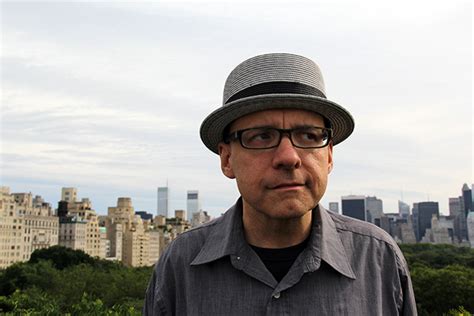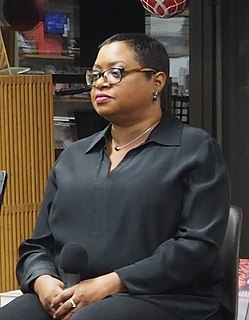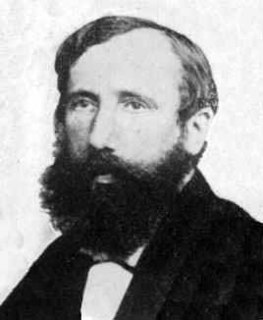Top 457 Assert Quotes & Sayings - Page 8
Explore popular Assert quotes.
Last updated on April 17, 2025.
Baghdad fell on April 9, 2003, Hussein and his regime were brought down, we declared "Mission Accomplished" and celebrated victory . . . and chaos erupted. We did not assert control and authority over the country, especially Baghdad. We did not bring with us the capacity to impose our will. We did not take charge. And Iraq did not in a few weeks magically transform itself into a stable nation with democratic leaders. Instead a raging insurgency engulfed the country.
Human groupings have one main purpose: to assert everyone’s right to be different, to be special, to think, feel and live in his or her own way. People join together in order to win or defend this right. But this is where a terrible, fateful error is born: the belief that these groupings in the name of a race, a God, a party or a State are the very purpose of life and not simply a means to an end. No! The only true and lasting meaning of the struggle for life lies in the individual, in his modest peculiarities and in his right to these peculiarities.
The need for sociability induce man to be in touch with his fellow men. However, this need might not ("ne saurait", Fr.) find its full (or complete) satisfaction in the conventional (or superficial, - "conventionnel", Fr.) and deceitful world, in which (or where) everyone is mainly (or mostly) trying to assert oneself in front of others ("devant les autres", Fr.), to appear, and hoping to find in society ("mondaine", Fr.) relationships some advantages for his interest and vanity (or vainglory or conceit", Fr).
When the function of libraries is put in terms of their contributions to the community, people see their centrality. The challenge to us is to continue to help them see it in those terms to describe our larger purposes. We must assert that libraries are central to the quality of life in our society; that libraries have a direct role in preserving democratic freedoms. Free access to information and the opportunity of every individual to improve his or her mind, employment prospects, and lifestyle are fundamental rights in our society.
One of the many burdens of the person professing Christianity has always been the odium likely to be heaped upon him by fellow Christians quick to smell out, denounce and punish fraud, hypocrisy and general unworthiness among those who assert the faith. In ruder days, disputes about what constituted a fully qualified Christian often led to sordid quarrels in which the disputants tortured, burned and hanged each other in the conviction that torture, burning and hanging were Christian things to do.
The anarchists put the thing upside down. They declare that the proletarian revolution must begin by doing away with the political organization of the state. But to destroy it at such a moment would be to destroy the only organism by means of which the victorious proletariat can assert its newly-conquered power, hold down its capitalist adversaries, and carry out that economic revolution of society without which the whole victory must end in a new defeat and a mass slaughter of the workers similar to those after the Paris commune.
Again and again it astonishes us that God makes himself a child so that we may love him, so that we may dare to love him, and as a child trustingly lets himself be taken into our arms. It is as if God were saying: I know that my glory frightens you, and that you are trying to assert yourself in the face of my grandeur. So now I am coming to you as a child, so that you can accept me and love me.
To better understand God we must first shatter our own idea of God - maybe even day after day. Maybe he's too great to stay compressed in the human mind. Maybe he splits it wide open; this is why pretentious intellectualism so often fails to comprehend the concept of God: it is only accepting of what it can explain while in the process finding higher sources offensive. What we may confidently assert is that faith is the opening that allows God, this unpredictable, unseen power, to travel in and out of the mind without all the pains of confusion.
If a man stopped me in the street and demanded of me my watch, I should refuse to give it to him. If he threatened to take it by force, I feel I should, though not a fighting man, do my best to protect it. If, on the other hand, he should assert his intention of trying to obtain it by means of an action in any court of law, I should take it out of my pocket and hand it to him, and think I had got off cheaply.
When I looked at [Fannie Lou] Hamer and that speech it seemed to me that she had to be the bravest woman ever, to come before that body and to assert her rights, when she knew that she was going lose that battle. But she did it anyway, because she knew she was speaking not just for herself and for that day, but for me, and for all the other young women who were coming behind her. She didn't know our names, but she was working for us. I find that incredibly empowering.
I offer gentle understanding to myself. I position myself in love, not fear. I look behind me with forgiveness. I look forward with festive anticipation. I embrace this holy moment and assert, "Now. This moment is the moment to love, the moment to serve, the moment to seize the legacy instead of the small. Now. Now I will live large, love boldly, reach to the edges of my unfurled heart and fully enrolled hope."
Some would assert that Providence was at work shaking out its pockets in Humanity's lap. Other would argue for that mindless choreographer, Chance. Either way it was a simple thing: a lost diary fell into the hands of a soul-sick war hero on a train from Bombay to Jaipur just when he'd grown tired of the scenery and needed something to keep his thoughts from the minefield of his wretched thoughts. In such mild ways is the groundwork laid for first kisses and ruined lives.
Is it not a rather fantastic historical irony that the torture techniques that the North Vietnamese used against McCain that forced him to offer a videotaped false confession are now the techniques the Bush administration is using to gain "intelligence" about terror networks. How is it possible to know that everything John McCain once said on videotape for the enemy was false, because it was coerced, and yet assert that everything we torture out of terror suspects using exactly the same techniques is true?
From their struggles to establish dominance over each other, siblings become tougher and more resilient. From their endless rough-housing with each other, they develop speed and agility. From their verbal sparring they learn the difference between being clever and being hurtful. From the normal irritations of living together, they learn how to assert themselves, defend themselves, compromise. And sometimes, from their envy of each other's special abilities they become inspired to work harder, persist and achieve.
You could hear the wind in the leaves, and on that wind traveled the screams of the kids on the playground in the distance, the little kids figuring out how to be alive, how to navigate a world that was not built for them by navigating a playground that was. . . Who am I to say that these things might not be forever? Who is Pete Van Houten to assert as fact the conjecture that our labor is temporary? All I know of heaven and all I know of death is in this park: an elegant universe in ceaseless motion, teeming with ruined ruins and screaming children.
If we are going to solve the challenges we face, you need a President who will pursue genuine solutions day in and day out. And that is my commitment to you. We need immigration reform that will secure our borders, and punish employers who exploit immigrant labor; reform that finally brings the 12 million people who are here illegally out of the shadows by requiring them to take steps to become legal citizens. We must assert our values and reconcile our principles as a nation of immigrants and a nation of laws. That is a priority I will pursue from my very first day.
To assert that the universe has a purpose implies the universe has intent. And intent implies a desired outcome. But who would do the desiring? And what would a desired outcome be? That carbon-based life is inevitable? Or that sentient primates are life's neurological pinnacle? Are answers to these questions even possible without expressing a profound bias of human sentiment? Of course humans were not around to ask these questions for 99.9999% of cosmic history. So if the purpose of the universe was to create humans then the cosmos was embarrassingly inefficient about it.
Cheap music, childish images, the vulgate in language, in its crassest sense, can penetrate to the deeps of our necessities and dreams. It can assert irrevocable tenure there. The opening bars, the hammer-beat accelerando of Edith Piaf's Je ne regrette rien - the text is infantile, the tune stentorian, and the politics which enlisted the song unattractive - tempt every nerve in me, touch the bone with a cold burn and draw me into God knows what infidelities to reason, each time I hear the song, and hear it, uncalled for, recurrent inside me.
It has been said by a distinguished philosopher that England is "usually the last to enter into the general movement of the European mind." The author of the remark probably meant to assert that a man or a system may have become famous on the continent, while we are almost ignorant of the name of the man and the claims of his system. Perhaps, however, a wider range might be given to the assertion. An exploded theory or a disadvantageous practice, like a rebel or a patriot in distress, seeks refuge on our shores to spend its last days in comfort if not in splendour.
That argument doesn’t make any sense to me. So we want to advance as a society and as a culture, but, say, if something happens to an African-American, we immediately come to his defense? Yet you want to talk about how far we’ve progressed as a society? Well, if we’ve progressed as a society, then you don’t jump to somebody’s defense just because they’re African-American. You sit and you listen to the facts just like you would in any other situation, right? So I won’t assert myself.
Among Negroes of my generation there was not only little direct acquaintance or consciously inherited knowledge of Africa, but much distaste and recoil because of what the white world taught them about the Dark Continent. There arose resentment that a group like ours, born and bred in the United States for centuries, should be regarded as Africans at all. They were, as most of them began gradually to assert, Americans. My father's father was particularly bitter about this. He would not accept an invitation to a 'Negro' picnic. He would not segregate himself in any way.
I was at a loss suddenly; but conscious all the while of how Armand listened; that he listened in the way that we dream of others listening, his face seeming to reflect on every thing said. He did not start forward to seize on my slightest pause, to assert an understanding of something before the thought was finished, or to argue with a swift, irresistible impulse -- the things which often make dialogue impossible. And after a long interval he said, 'I want you. I want you more than anything in the world.
Why is it we want so badly to memorialize ourselves? Even while we're still alive. We wish to assert our existence, like dogs peeing on fire hydrants. We put on display our framed photographs, our parchment diplomas, our silver-plated cups; we monogram our linen, we carve our names on trees, we scrawl them on washroom walls. It's all the same impulse. What do we hope from it? Applause, envy, respect? Or simply attention, of any kind we can get? At the very least we want a witness. We can't stand the idea of our own voices falling silent finally, like a radio running down.
A number of aspects of mathematics are not much talked about in contemporary histories of mathematics. We have in mind business and commerce, war, number mysticism, astrology, and religion. In some instances, writers, hoping to assert for mathematics a noble parentage and a pure scientific experience, have turned away their eyes. Histories have been eager to put the case for science, but the Handmaiden of the Sciences has lived a far more raffish and interesting life than her historians allow.
Manliness has been defined as assertion of the self. Womanliness has been defined as the nurturing of selves other than our own - even if we quite lose our own in the process. (Women are supposed to find in this loss their true fulfillment.) But every individual person is born both to assert herself or himself and to act out a sympathy for others trying to find themselves - in Christian terms, meant to love one's self as one loves others ... Jesus never taught that we should split up that commandment - assigning 'love yourself' to men, 'love others' to women. But society has tried to.
One of the challenges is to create an equally positive, satisfying sense of femininity and feminine identity in a different way so that there are things you're saying yes to and satisfying that urge that your daughter has to be assert her girlness. The surface level of the culture, and really several inches into it, makes that very hard to do. I hate to put another thing on parents' plates. But the culture is very intentional in what it's telling your daughter and what it's telling you about the message of femininity. And if you're not intentional and conscious back, you lose.
The spirit in the body is like wine in a glass; when it spills, it seeps into air and earth and light….It’s a mistake to think it’s the small things we control and not the large, it’s the other way around! We can’t stop the small accident, the tiny detail that conspires into fate: the extra moment you run back for something forgotten, a moment that saves you from an accident – or causes one. But we can assert the largest order, the large human values daily, the only order large enough to see.
Calvinism emphasizes divine sovereignty and free grace; Arminianism emphasizes human responsibility. The one restricts the saving grace to the elect; the other extends it to all men on the condition of faith. Both are right in what they assert; both are wrong in what they deny. If one important truth is pressed to the exclusion of another truth of equal importance, it becomes an error, and loses its hold upon the conscience. The Bible gives us a theology which is more human than Calvinism and more divine than Arminianism, and more Christian than either of them.
The Prophets Isaiah and Ezekiel dined with me, and I asked them how they dared so roundly to assert, that God spoke to them; and whether they did not think at the time, that they would be misunderstood, & so be the cause of imposition. Isaiah answer'd, I saw no God, nor heard any, in a finite organical perception; but my senses discover'd the infinite in every thing, and as I was then persuaded, & remain confirm'd; that the voice of honest indignation is the voice of God, I cared not for consequences but wrote.
I assert once again as a truth to which history as a whole bears witness that men may second their fortune, but cannot oppose it; that they may weave its warp, but cannot break it. Yet they should never give up, because there is always hope, though they know not the end and more towards it along roads which cross one another and as yet are unexplored; and since there is hope, they should not despair, no matter what fortune brings or in what travail they find themselves.
We do not admire, we hardly excuse, the fanatic who wrecks this world for love of the other. But what are we to say of the fanatic who wrecks this world out of hatred of the other? He sacrifices the very existence of humanity to the non-existence of God. He offers his victims not to the altar, but merely to assert the idleness of the altar and the emptiness of the throne. He is ready to ruin even that primary ethic by which all things live, for his strange and eternal vengeance upon some one who never lived at all.
I think when you're running for president, especially someone that's never held elected office, there's one set of things that you may view the world through - a lens that you may view the world through. Then, you get elected and you get good people. And those good people bring you the facts. And they bring you, "Here's what's going on. Here are our options. Here's what happens if you do this. Here's what happens when you do that." And that reality begins to assert itself. And you have to react to that. You're now the president. You're no longer a candidate.
Having spent 200 hours on the above, the young player, even if he possesses no special talent for chess, is likely to be among those two or three thousand chessplayers [who play on a par with a master]. There are, however, a quarter of a million chessplayers who annually spend no fewer than 200 hours on chess without making any progress. Without going into any further calculations, I can assert with a high degree of certainty that nowadays we achieve only a fraction of what we are capable of achieving.
A great deal has been said about love at first sight; I am perfectly aware of love's retrospective tendency to make a legend of itself, turn its beginnings into myth; so I don't want to assert that it was love; but I have no doubt there was a kind of clairvoyance at work: I immediately felt, sensed, grasped the essence of Lucie's being or, to be more precise, the essence of what she was later to become for me; Lucie had revealed herself to me the way religious truth reveals itself.
The script changed so much over seven months and just had loads and loads of re-writes. I tried to tailor things to what I was interested in, like the relationship with the dad changed quite a lot because I thought one of the things when you're a young guy one of your biggest fears is this irrational fear of walking in your dad's footsteps and living the same life as him. I thought, even if your dad's a good guy, you just want to assert your independence on everything and it causes these irrational sort of rages.
Those who assert that the mathematical sciences say nothing of the beautiful or the good are in error. For these sciences say and prove a great deal about them; if they do not expressly mention them, but prove attributes which are their results or definitions, it is not true that they tell us nothing about them. The chief forms of beauty are order and symmetry and definiteness, which the mathematical sciences demonstrate in a special degree.




































